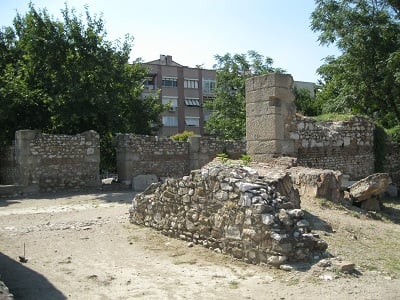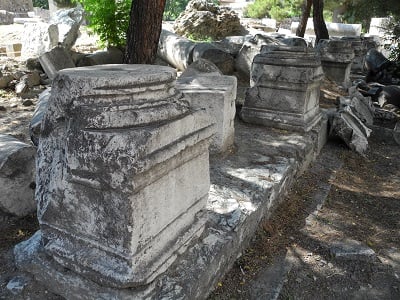Thyatira was the fourth of seven churches in Asia Minor that received a message from Christ at the end of the first century. What does this message mean for us?

Pillars from ancient Thyatira (photo by Joel Meeker).
Spanning 12 verses (Revelation 2:18-29), the message to Thyatira was one of the longest messages and, like most of these messages, included both correction and encouragement for the Christians of Thyatira. Before analyzing the message and its importance for us today, let’s briefly consider the history of this city.
History of Thyatira
Located in the northern part of Lydia on the Lycus River, Thyatira’s early history is not well known. Its name means “the castle of Thya” (International Standard Bible Encyclopedia, 1939, “Thyatira”).
Refounded by Seleucus I Nicator approximately three centuries before the time of Christ, the small city became a commercial center for the economy of the area. Situated on a lesser road between Pergamos and Sardis, residents of the city became wealthy and, like people of other nearby cities, built temples to pagan gods.
“Thyatira was specially noted for the trade guilds which were probably more completely organized there than in any other ancient city. Every artisan belonged to a guild, and every guild, which was an incorporated organization, possessed property in its own name, made contracts for great constructions, and wielded a wide influence.
“Powerful among them was the guild of coppersmiths; another was the guild of the dyers, who, it is believed, made use of the madder-root instead of shell-fish for making the purple dyestuffs. A member of this guild seems to have been Lydia of Thyatira, who, according to Acts 16:14, sold her dyes in Philippi. The color obtained by the use of this dye is now called Turkish red.
“The guilds were closely connected with the Asiatic religion of the place. Pagan feasts, with which immoral practices were associated, were held, and therefore the nature of the guilds was such that they were opposed to Christianity.
“According to Acts 19:10, Paul may have preached there while he was living at Ephesus, but this is uncertain; yet Christianity reached there at an early time. It was taught by many of the early church that no Christian might belong to one of the guilds, and thus the greatest opposition to Christianity was presented” (ibid.).
Little can be seen of the ancient ruins of Thyatira (photo by Joel Meeker).
The message
The message to Thyatira was: “And to the angel of the church in Thyatira write, ‘These things says the Son of God, who has eyes like a flame of fire, and His feet like fine brass: “I know your works, love, service, faith, and your patience; and as for your works, the last are more than the first. Nevertheless I have a few things against you, because you allow that woman Jezebel, who calls herself a prophetess, to teach and seduce My servants to commit sexual immorality and eat things sacrificed to idols.
“And I gave her time to repent of her sexual immorality, and she did not repent. Indeed I will cast her into a sickbed, and those who commit adultery with her into great tribulation, unless they repent of their deeds. I will kill her children with death, and all the churches shall know that I am He who searches the minds and hearts. And I will give to each one of you according to your works.
“Now to you I say, and to the rest in Thyatira, as many as do not have this doctrine, who have not known the depths of Satan, as they say, I will put on you no other burden. But hold fast what you have till I come.
“And he who overcomes, and keeps My works until the end, to him I will give power over the nations—‘He shall rule them with a rod of iron; they shall be dashed to pieces like the potter’s vessels’—as I also have received from My Father; and I will give him the morning star. He who has an ear, let him hear what the Spirit says to the churches”’” (Revelation 2:18-29).
Understanding the message
While the other messages to the churches of Revelation 2 and 3 begin with descriptions of Jesus and what He does, this message clearly states that it is from “the Son of God” (verse 18). Perhaps Jesus chose to make His identity undeniably clear in this introduction because the correction He soon gives is especially strong.
Showing that He clearly understands the whole picture and is thus eminently qualified to evaluate this congregation’s circumstances, Jesus begins by noting that He knows the works, love, service, faith and patience practiced by its members. Jesus further notes that these good works had increased. But these good works did not make up for the things Jesus had against them.
Specifically, Christ was displeased that the members of this congregation allowed a woman named Jezebel (verse 20) to falsely teach that it was okay to commit sexual immorality and eat things sacrificed to idols. As for who this Jezebel was, she may have been someone with this name at the time; or the name may represent a person like the infamous Queen Jezebel of the Old Testament, an idolatress who massacred the prophets of God (1 Kings 18:4) and influenced her husband, King Ahab, to do more evil in God’s sight “than all who were before him” (1 Kings 16:30).
Jezebel may also be symbolic of a false church or religion. The book of Revelation is filled with symbolism, and within this book a woman is used to represent both the true Church Jesus began (Revelation 12:10, 13-17) and a great false church called Babylon the Great (Revelation 17:3-6, 18). This Jezebel may be symbolic of the latter, “great harlot” that Jesus Christ will judge and punish at His second coming (Revelation 2:20-22; 17:1-2) as God punished King Ahab’s evil queen in the Old Testament.
“The opinions which she [Jezebel] held, and the practices into which she led others, appear to have been the same which are referred to in Rev 2:6 and Rev 2:14-15 of this chapter. The difference was, that the teacher in this case was a woman—a circumstance which by no means lessened the enormity of the offence; for, besides the fact that it was contrary to the whole genius of Christianity that a woman should be a public teacher, there was a special incongruity that she should be an advocate of such abominable opinions and practices” (Albert Barnes, Notes on the Bible, Revelation 2:20).
It is also interesting to note that while the members at Ephesus and Pergamos also had to resist similar ungodly pulls of the world (Revelation 2:6, 14-15), the members at Thyatira had a teacher among them openly advocating this sinful conduct. Christ was disappointed that the church at Thyatira allowed her to continue to teach heresy and seduce members to sin.
As for eating “things sacrificed to idols” and committing “sexual immorality” (verse 20), this was the common method of pagan celebration. Eating freshly roasted meat and engaging in sexual intercourse with temple prostitutes had been the enticing practice for centuries. Although some believe these references are symbolic of spiritual unfaithfulness to Christ rather than literal acts, the prevalence of sexual immorality in the first century and the development of a libertine branch of gnosticism suggest that some members of the church at Thyatira saw no harm in indulging in the pleasures that others were enjoying.
Because Christ had given this woman and her followers time to repent and they had not, He said that they would have great tribulation and that her children would be killed. These actions would serve as an example so all churches would know that Jesus “searches the minds and hearts” of His people (verses 21-23).
Of course, there were people in Thyatira who did not accept or practice the doctrine advanced by Jezebel. They had not “known [practiced] the depths of Satan” (verse 24). Christ told them to hold fast to what they had—God’s way of life—until He came again (verse 25).
Ruins from ancient Thyatira (photo by Joel Meeker).
The message to Thyatira ends with a promise to overcomers that they will have power over the nations and be with Christ, “the morning star” (verses 26-28).
Meaning for us
An important lesson from this message to Thyatira is the insidious effect of false teaching when it is allowed within the Church. While persecution from without can be resisted and endured, heresy from within is especially insidious.
The introduction of false teaching within the Church is often presented as new truth, a clarification or a matter of greater spiritual depth. As gullible members explore the new teaching, they are assured that they are growing in the “grace and knowledge of our Lord and Savior Jesus Christ” (2 Peter 3:18).
Describing this process of seduction from within, Paul told the elders in Ephesus: “For I know this, that after my departure savage wolves will come in among you, not sparing the flock. Also from among yourselves men will rise up, speaking perverse things, to draw away the disciples after themselves” (Acts 20:29-30).
Paul’s words to these elders proved to be true. By the end of the first century, false teachers were actively distorting the fundamental beliefs upon which the New Testament Church of God had been founded.
Addressing this problem, Jude wrote: “Beloved, while I was very diligent to write to you concerning our common salvation, I found it necessary to write to you exhorting you to contend earnestly for the faith which was once for all delivered to the saints. For certain men have crept in unnoticed, who long ago were marked out for this condemnation, ungodly men, who turn the grace of our God into lewdness and deny the only Lord God and our Lord Jesus Christ” (Jude 1:3-4).
How did God intend for members to be protected from false teaching? First, the elders of the Church were to provide unified leadership (Acts 15) and discipline elders who sin (1 Timothy 5:17-20). Second, members were told to “test all things; hold fast what is good” (1 Thessalonians 5:21).
Unlike some at Thyatira, members of the Church of God at Ephesus followed this instruction and were recognized by Christ for doing so. As Jesus told them, “I know your works, your labor, your patience, and that you cannot bear those who are evil. And you have tested those who say they are apostles and are not, and have found them liars; and you have persevered and have patience, and have labored for My name’s sake and have not become weary” (Revelation 2:2-3).
An overall lesson from Thyatira
As you study the information on this website and ask God to help you understand the original “faith which was once for all delivered to the saints” (Jude 1:3), you are going to discover that much false teaching is now commonly accepted. And, like members at Thyatira, you will have to decide whether to follow the false teaching that has crept into Christianity or the true teaching of Jesus and His disciples.
As you go through this process, keep this important lesson from Thyatira clearly in mind: Resist false religious teaching.
If we can assist you in developing a closer relationship with God and in living according to God’s timeless instructions, feel free to contact us. We are here to help.
For further study on how to live as God desires, see the “Change” section of this website.





